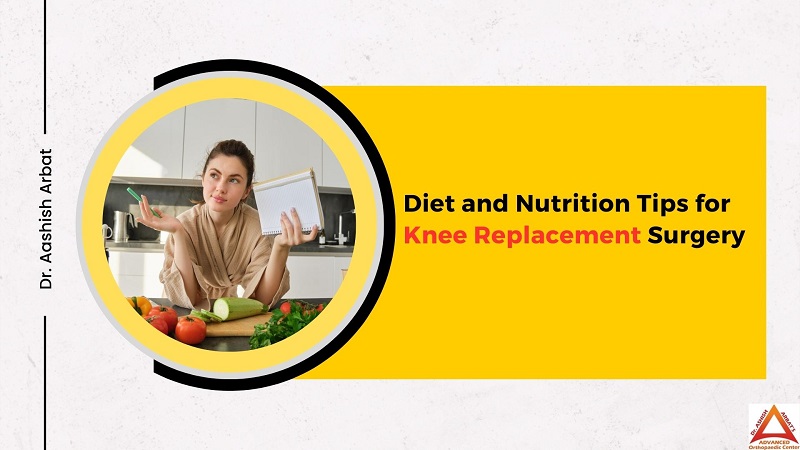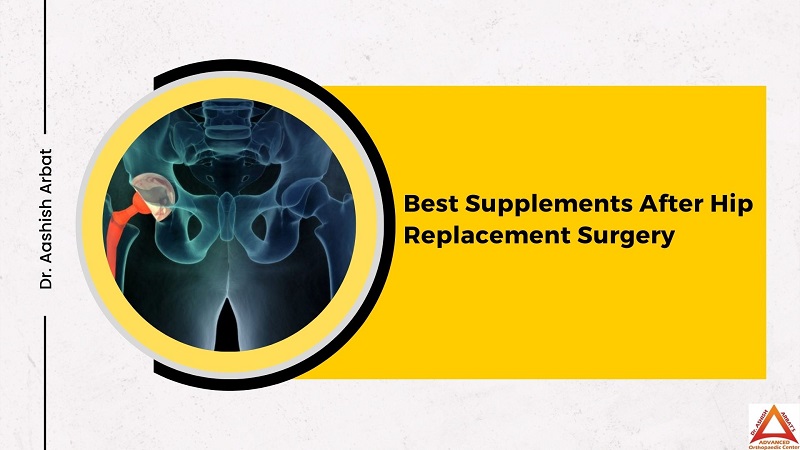Diet and Nutrition Tips for Knee Replacement Surgery
Proper nutrition is vital for healing after any surgery. Eating well-balanced meals and snacks will ensure you recover fast and help you feel your best. What you eat has an impact on your well-being. If you do not take proper food in sufficient quantity, you will become tired easily. Be sure you make time to eat—even if you do not feel hungry. Dr. Aashish Arbat, a well-reputed knee replacement surgeon in Pune suggests diet and nutrition tips for knee replacement surgery. Diet and Nutrition Tips for Knee Replacement Surgery After any surgery eating foods rich in certain nutrients is important for proper healing. Protein: Protein helps repair and build healthy tissue. Iron: Iron works in each of your body’s cells to help make energy. Vitamin C: Vitamin C helps your body repair damaged tissues, keeps your bones and teeth strong, and helps your body absorb iron. Calcium: This helps build and maintain your bones. Your muscles move, your blood clots and your nerves send messages properly because of calcium. Fiber: Fiber helps your body produce regular bowel movements. What Foods to Avoid After Knee Replacement Surgery? After knee surgery, it is important to avoid certain foods to promote healing and recovery. Here are some foods to avoid: Sugary Foods: These can increase inflammation and slow the healing process. Processed Foods: High in refined sugars, and unhealthy fats and these can hamper recovery. Spicy Foods: It’s best to stay away from the above types for at least two weeks post-surgery to avoid digestive discomfort. Alcohol: Can interfere with medications and slow down the healing process. High-Sodium Foods: These can lead to increased swelling and should be limited. By keeping away from these foods, you can help ensure a smoother recovery after knee surgery. Best Vitamins After Knee Surgery Post-knee surgery, your system requires a host of nutrients, such as vitamins and minerals, to fix tissues and boost your defence system. Vitamin C Supports collagen cross-linking, which strengthens wounds. Incorporate broccoli, bell peppers, oranges, guava, brussels sprouts, kiwi, and strawberries into your daily diet. Vitamin A, Dr. Aashish Arbat an acclaimed Knee Replacement Doctor in Pune mentions that this vitamin helps with the development of bone and soft tissue. He suggests including Lamb liver, butternut squash, carrots, cantaloupe, clams, collard greens, sweet potato, spinach etc. Vitamin D, Plays a vital role in building healthy bones. Get adequate of this nutrient if you have a bone fracture or a joint replacement, to make your bones strong. Studies show that women with low blood levels of vitamin D have higher chances of pain during recovery than women with normal vitamin D levels. Vitamin B There’s research to support that some B vitamins may be beneficial following surgery. • Avocados • Brown rice • Chicken • Edamame • Lentils • Salmon • Spinach Top 5 Mistakes After Knee Replacement • Avoiding physical therapy • Overexerting the knee • Skipping medication • Not following proper wound care • Not preparing the home for recovery Fruits to Eat After Knee Surgery • Berries • Oranges • Kiwi • Papaya To put it in simple words, fruits rich in vitamin C are excellent choices for rebuilding collagen and soft tissues. Role of Turmeric After Knee Replacement Surgery Dr. Arbat, an Orthopedic Doctor in Pune says that research shows that taking 1500 mg of turmeric extract daily for 28 days can reduce knee joint pain and improve physical function. Turmeric after knee replacement surgery is essential as turmeric extract contains mostly curcuminoids. Foods to Eat After Knee Replacement Surgery After knee replacement surgery, it’s important to focus on nutritious foods that aid in recovery. Here are some recommended foods:’ Lean Proteins: Foods like lean meats, poultry, fish, and eggs help repair tissues and boost immunity. Fruits and Vegetables: These are rich in vitamins, minerals, and fibre, which are essential for healing. Whole Grains: Foods such as brown rice, quinoa, and whole grain bread provide energy and fibre. Healthy Fats: Incorporate sources like avocados, nuts, and olive oil to support overall health. Dark Leafy Greens: Vegetables like spinach and kale are high in antioxidants and promote good digestion. Maintaining a balanced diet with these foods can significantly enhance your recovery process after surgery. Magnesium After Knee Replacement Surgery Dr. Arbat, a recognized knee doctor Pune mentions that Magnesium is undeniably important for general healing, and it is effective in reducing acute and chronic pain after surgery. FAQ Foods to eat after surgery to promote healing? These foods will provide your body with the energy and nutrition it needs to fight off infections, accelerate healing, increase your strength and energy and maintain your nutrient stores. take Salmon as food for Omega-3, Oats for digestive fibre, Broccoli as this is a vitamin powerhouse, Spinach for iron, Bone Broth since its nutrient dense, Quinoa for complete protein, Lentil for plant protein, Avocado for healthy fats, Pumpkin Seeds for zinc, chicken breast for lean protein source, Greek Yogurt as probiotic, eggs as its nutrient dense, oranges for Vitamin C, Almonds as healthy fats and sweet potatoes for immune support. Conclusion Post your knee replacement surgery, you can gradually get back to your regular activities. This is much easier with enough rest, physical therapy, and pain management. What most people don’t understand is that vitamins also play an essential role in the recovery process. While your doctor will recommend a diet and share nutrition tips, your supplements at times support recovery post knee replacement surgery. Reach out to a reputed Orthopedic Doctor or a healthcare to for diet and nutrition tips for knee replacement surgery.


